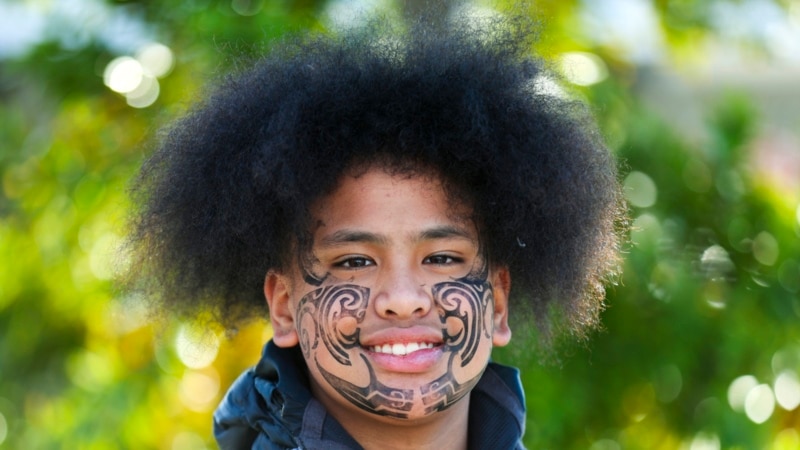This website uses cookies so that we can provide you with the best user experience possible. Cookie information is stored in your browser and performs functions such as recognising you when you return to our website and helping our team to understand which sections of the website you find most interesting and useful.
 WELLINGTON, New Zealand —
WELLINGTON, New Zealand —
When Ngarauru Mako told her family she was calling off Christmas festivities in favor of celebrating Matariki, the Māori new year holiday that's experiencing a renaissance in New Zealand, her children didn't believe her.
"We grew up with Christmas because it was just what you did, but I realized it wasn't my thing," said Mako, who is Māori, a member of New Zealand's Indigenous people. "I just decided myself to cancel Christmas, be the Grinch, and take on Matariki."
Now in its third year as a nationwide public holiday in New Zealand, Matariki marks the lunar new year by the rise of the star cluster known in the Northern Hemisphere as the Pleiades. The holiday is seeing a surge in popularity, even as political debates about race in New Zealand have grown more divisive. Accompanying the holiday's rise is a tension between those embracing Indigenous language and culture, and a vocal minority who wish to see less of it.
"For much of our past, since the arrival of settlers to this land, mostly out of Great Britain, we've really looked to mimic and build our identity off Great Britain," said Rangi Mātāmua, professor of Mātauranga Māori -– Māori knowledge — at Massey University and an adviser to the government on Matariki.
"But I think as we've moved a number of generations on, Aotearoa New Zealand is starting to come of age in terms of our understanding of our identity," he added, using both the Māori and English names for the country.
When New Zealand established the national day in 2022, it became the first nation in the world to recognize an Indigenous-minority holiday, scholars including Mātāmua believe. But many did not know what it was. Even so, 51% of people did something to mark the day, official figures show, and that number grew to 60% in 2023. Matariki falls on a different midwinter date each year based on the Māori lunar calendar; in 2024 it was officially celebrated June 28.
A 700-year-old tradition that fell out of observance in modern times — even among the 1 million Māori who make up New Zealand's population of 5 million -– the fortunes of Matariki changed over the past few decades, as Māori language, culture and traditions saw a passionate resurgence.
"Māori culture has been oppressed for a long, long time. We lost our reo — our language — nearly, we nearly lost our identity," said Poropiti Rangitaawa, a musician who performed Māori songs this month at a family Matariki celebration outside of Wellington, the capital city. "But with the hope of our people, our old people, our ancestors, they have brought it up and now it's really strong."
The carnival day at Wainuiomata where Rangitaawa played was one of many events New Zealanders of all ethnicities attended to mark Matariki. Some attended predawn ceremonies where steam from food is released to "feed the stars" and lists of names are read remembering the dead and those born since the last celebration.
Dotted around Wellington were remembrance spots — in the back room of a church, in a garden -– where visitors displayed notes to those they had lost: a dad, an aunt, a cat.
"It's only just now that I'm realizing Matariki is about the stars, and I love the fact that they've got a star for the ones we've lost in the year," said Casey Wick, attending a celebration with her family.
For many, a growing knowledge of the holiday has come through their children, which is typical of New Zealand's Indigenous movement. Protests in the 1970s seeking recognition of the language gave rise to Māori language pre-schools whose first generation of graduates are fluent speakers.
Every elementary school in New Zealand now recognizes Matariki, and many this month hosted shared meals for families to celebrate. Children come home singing the names of the nine Matariki stars to the tune of the Macarena.
"I learn more from her about Matariki than I could ever give to her," said Liana Childs, whose daughter Akaylia, 9, recited the stars of the cluster perfectly. The family is not Māori, Childs said, but they studied the Māori seasons, which guide the planting of crops and when to hunt.
"I think it's just brought us closer together as a family," she said.
The political climate for Māori language and culture, however, is complicated.
Words in the language are now commonplace in conversations, but Māori has its detractors, too. Matariki was established as a national day under New Zealand's previous center-left government, which urged the country to embrace Māori culture. The government, however, was often decried for doing little to address woeful economic, health and justice issues for Māori that became entrenched after New Zealand was colonized in the 19th century.
A change of government last October meant a new era for Matariki. The party leading the current center-right coalition supports the day, but one of its coalition partners does not. The government has also pledged to scrap some policies recognizing Māori that were passed by its predecessors, getting rid of a Māori health agency that prioritized Indigenous New Zealanders, who die younger than people of non-Maori descent; reversing a movement to grant Māori names to government agencies, some of which have already reverted to their English titles; and halting plans for shared management of public utilities with Māori tribes.
One of the governing parties has provoked a fresh debate about New Zealand's founding document, the Treaty of Waitangi -– signed between Māori tribes and the British Crown in 1840 -– with the suggestion that modern interpretations have given Māori too many rights. The rumblings about a revisited treaty have prompted protest marches.
"Governments will come and governments will go," said Mātāmua, the professor. "Matariki existed before government, and it will continue to exist after the current government."
Māori language and culture almost died out when earlier politicians opposed their expression, Mātāmua said, but in a nation where many are now enthusiastic about it, any government trying to curtail the celebration would learn "that perhaps trying to put this genie back in the bottle would be very, very difficult."
At the Matariki celebration in Wainuiomata, Tash Simpson stood with friends at a stall that fused Māori and Kenyan crafts.
"We're stronger now. Our people are more knowledgeable now," she said of political threats to Māori. "But now we know what's coming and we're ready."



 Africana55 Radio
Africana55 Radio 


